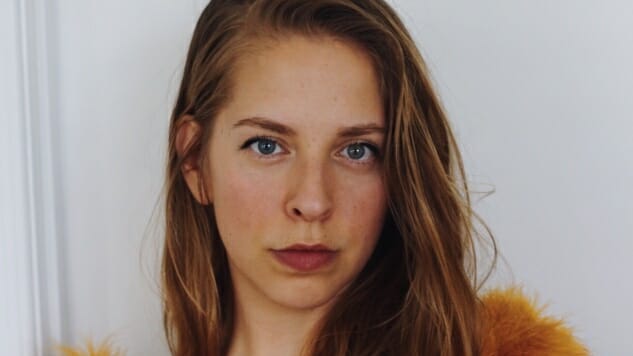Julia Nunes Finds Her Own Way
Photo by Chase Burnett
“Make sure you take care of your body while sitting on the floor,” the musician Julia Nunes says to a crowd of 40 at Downward Dog Dance, a studio and community space nestled in a strip mall on the outskirts of Richmond, Va. While some devotees arrived early enough to secure metal folding chairs, most of us are fidgeting to sit comfortably on the uncarpeted floor, taking Nunes’s directive to “listen to your body” as we settle in for her intimate show. In person and in her voluminous social media presence, Nunes gently encourages her audience to take care of themselves, though she advocates for practices that are less glossy than the face masks and serums that have become totems of our consumerist “self-care” moment. For Nunes, listening to your body means not-so-sexy practices like crossing and uncrossing your legs, drinking water (“I want to be an advertisement for water,” she tells me earlier that day), and breathing. Her vibe reminds me of a low-key guru, one who’ll coax you toward inner peace without making you buy anything. She’s charmingly self-aware about how this earth-mother vibe comes off, though: “I’m not high, I swear! My brain is just fun to be in.”
Nunes’s latest music, compiled on a compact album called UGHWOW, out this Friday, bears this statement out in a musical sense. Whereas her earlier work was primarily ukulele-based indie pop, the newer material takes a hard turn toward bass-heavy R&B, which showcases her distinctive, low-alto voice and knack for catchy melodies but fills your headphones with gut-punch beats and cavernous vocal effects. “I wanted to make music that sounded like it could fit on a playlist of music I was jamming to in my regular life,” Nunes says, citing SZA, Frank Ocean, Drake, and Mac Miller as influences. Given that Nunes began her career as a teenager strumming original tunes on YouTube and opening for Ben Folds, this surprising twist in her evolution suggests that living inside her brain must be, yes, fun—even if the new songs dwell in post-breakup sadness and hard-core introspection. In her words, UGHWOW could soundtrack “a rave at the end of the world.”
Watch the exclusive premiere of Julia Nunes’ video for Feels Good>
Part of why Nunes can keep shape-shifting—playing living room tours as well as club dates, making sparkly acoustic music and sludgy dark pop—stems from her early decision to remain completely independent and in charge of her career. When we say “indie pop” or “indie rock” these days, we’re often describing a genre or sound more than a financial situation, as labels like Sub Pop, Matador, and Polyvinyl host artists whose music sounds “indie” but gets distributed through structures resembling scaled-down versions of major labels. Nunes’s arrangement differs considerably: like Amanda Palmer and a growing cohort of media-savvy young artists, she finances her music through Kickstarter and Patreon but retains control of her masters and self-directs basically every aspect of her career. “I do have a super unique situation on my end,” she explains. “It’s so much freedom.”
-

-

-

-

-

-

-

-

-

-

-

-

-

-

-

-

-

-

-

-

-

-

-

-

-

-

-

-

-

-

-

-

-

-

-

-

-

-

-

-








































